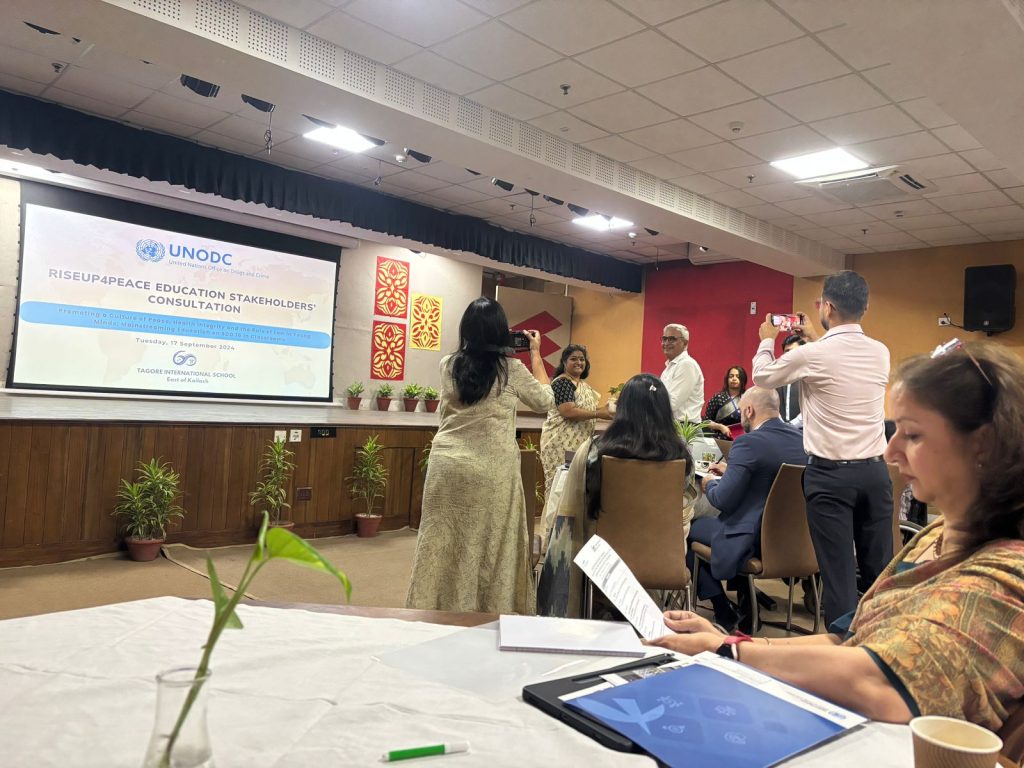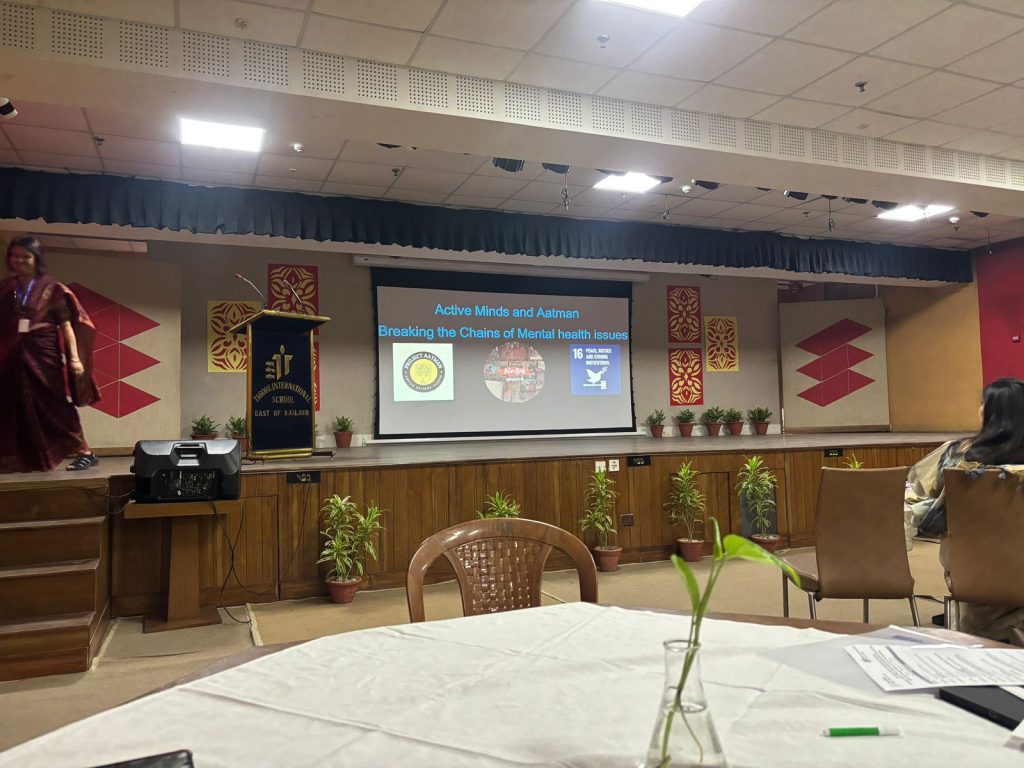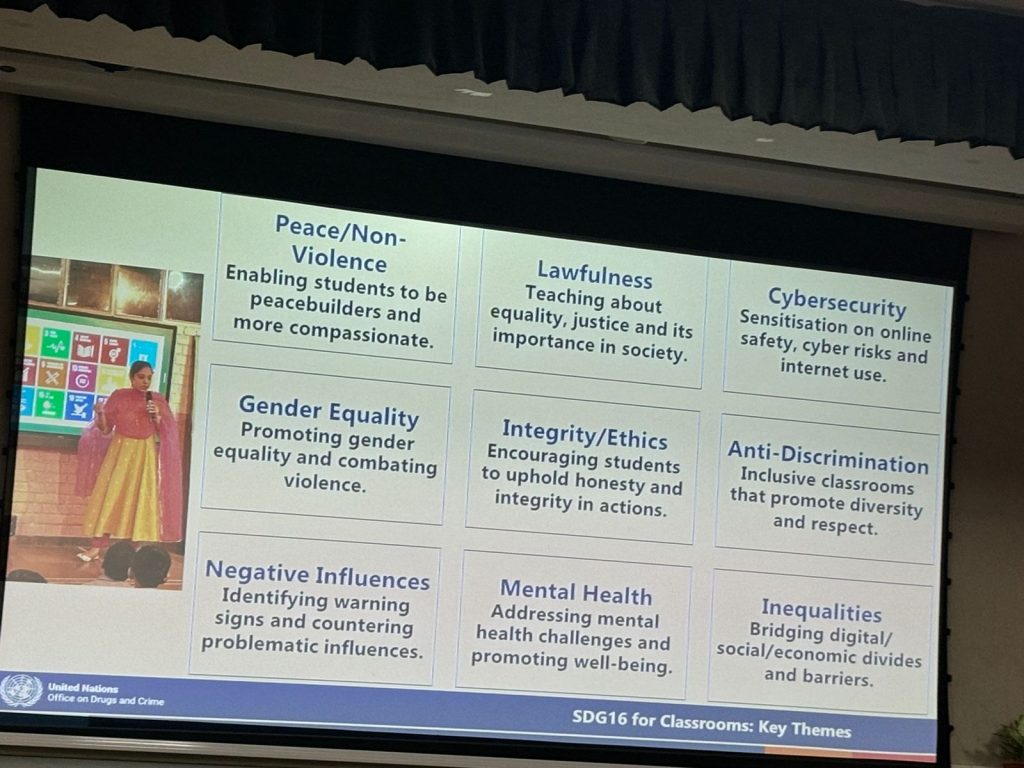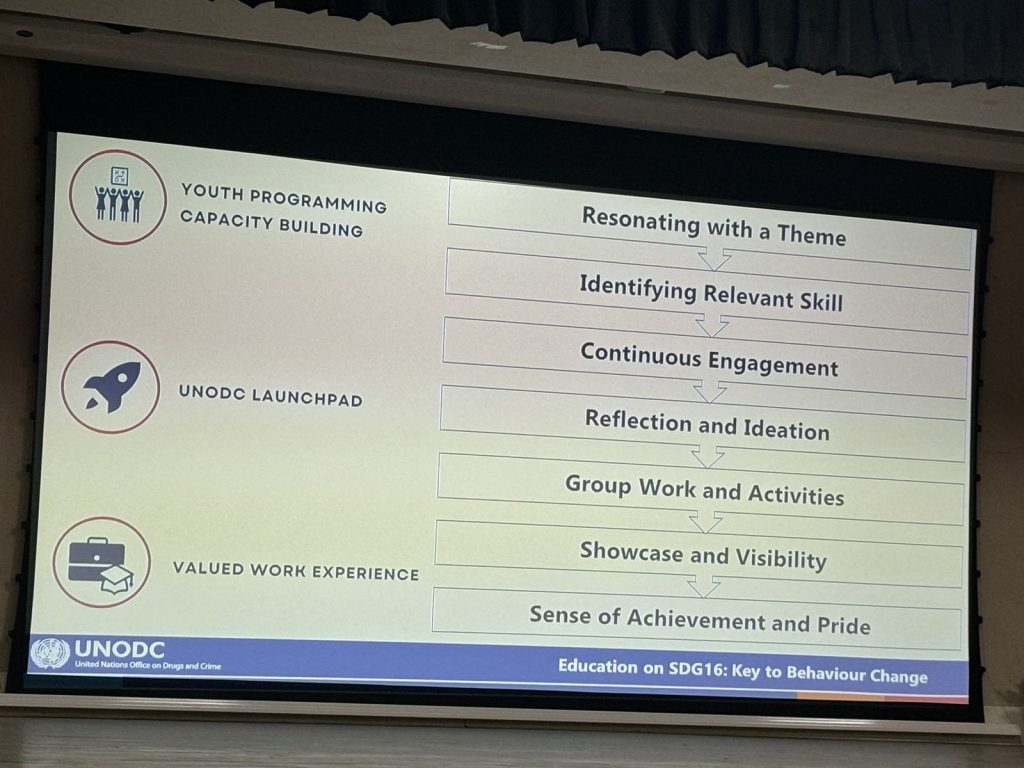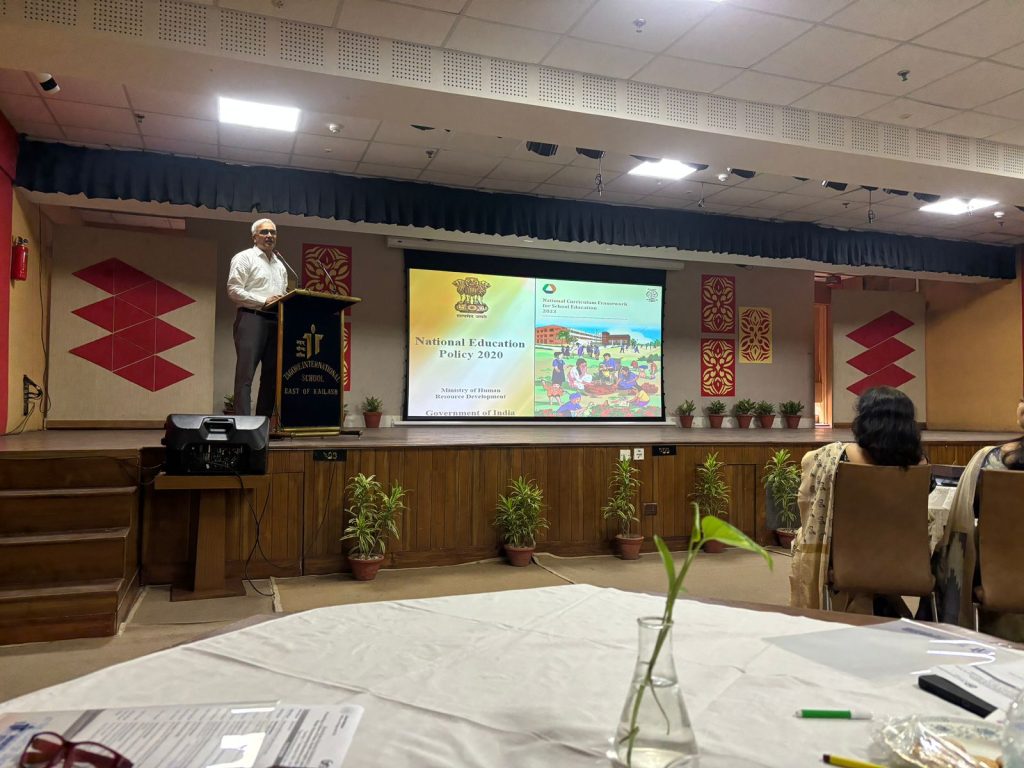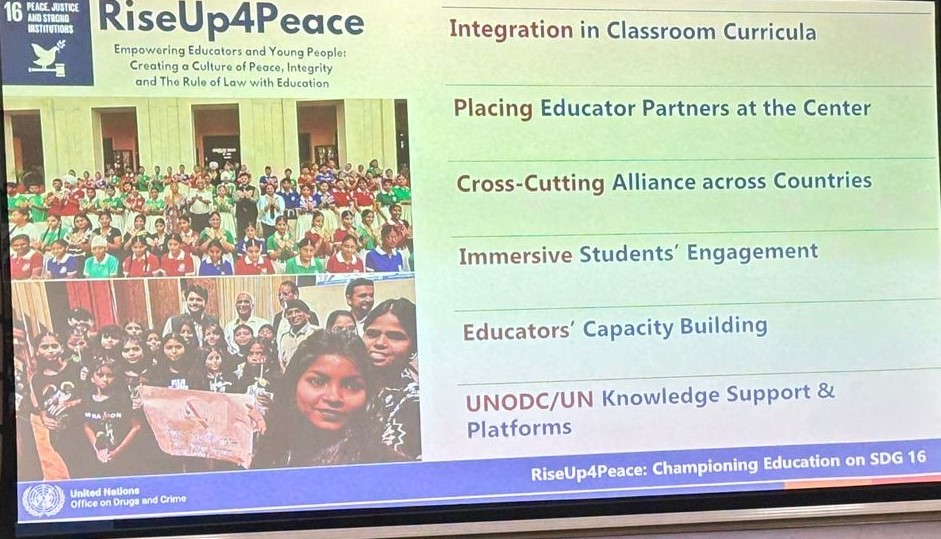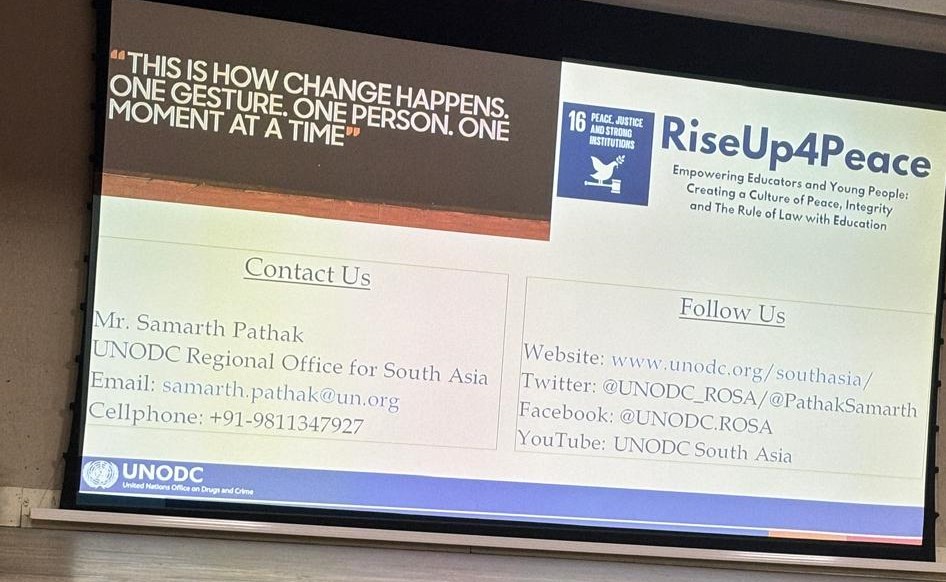REPORT ON RISEUP4PEACE EDUCATION STAKEHOLDERS’ WORKSHOP ON MAINSTREAMING EDUCATION ON PEACE BY UNODC
Theme : Promoting a Culture of Peace, Health Integrity, and the Rule of Law in Young Minds - Mainstreaming Education on SDG 16 in Classrooms
Date : Tuesday, 17 September 2024
Venue : Tagore International School, East of Kailash
The RiseUp4Peace Education Stakeholders’ Round table workshop took place on 17 September 2024 at Tagore International School, East of Kailash. The event brought together educators from various organizations to discuss the incorporation of Sustainable Development Goal 16 (SDG 16) – focusing on peace, justice, and strong institutions in the school curricula.
The workshop aimed to cultivate a culture of peace, integrity, and respect for the rule of law among young minds, with a special focus on equipping students to actively contribute to peaceful, just, and sustainable societies.
Registration and Opening Ceremony
The workshop commenced with a formal registration process, followed by a ceremonial lighting of the lamp, symbolizing the collective commitment to peace and education.
Welcome Note
The welcome address was delivered by Ms. Mallika Preman, Principal of Tagore International School, East of Kailash, who extended a warm welcome to all participants. Ms. Preman set the tone for the day, highlighting the crucial role that educational institutions play in shaping the values and mindset of future generations. She emphasized that creating a conducive environment to enhance students mental wellbeing and embedding the principles of SDG 16 into the classroom experience would help foster a generation of young individuals who are not only academically capable but also socially responsible and ethically driven.
Keynote Address
The keynote address on "RiseUp4Peace Education Stakeholders’: Promoting a Culture of Peace, Health Integrity, and the Rule of Law in Young Children" was delivered by Mr. Marco Teixeira, the Regional Representative for South Asia at the United Nations Office on Drugs and Crime (UNODC). Mr. Teixeira underscored the importance of SDG 16 in ensuring that societies are inclusive, peaceful, and just. He spoke about the critical role that education plays in raising awareness among young people about peace, human rights, and justice. According to Mr. Teixeira, children are more receptive to values of fairness, inclusion, and non-violence when these principles are integrated into their educational experiences from an early age. He urged educators to consider SDG 16 not as an abstract concept but as an actionable framework that can transform how students perceive their role in the world.
Presentation: Why Education on SDG 16 Matters
The next presentation, titled "Inspiring Action and Building Resilience in Young People: Why Education on SDG 16 Matters," was delivered by Mr. Samarth Pathak, Communications Officer (South Asia) at UNODC. Mr. Pathak highlighted the importance of teaching SDG 16 for developing future leaders and fostering qualities such as conflict resolution, negotiation, and advocacy for human rights, peace, and justice. He emphasized that educating students on SDG 16 enables them to identify the root causes of violence, conflict, and inequality, allowing them to actively prevent disputes and promote peaceful coexistence in their communities. Students who are aware of human rights are more likely to challenge corruption and injustice. Mr. Pathak also pointed out the interconnectedness of global challenges and how SDG 16 aligns with the values of global citizenship. He concluded by stressing that peaceful societies are crucial for achieving other SDGs, inspiring young people to contribute to broader sustainable development efforts.
National Education Policy 2020: Policy Reflections
Following the presentation on SDG 16, Dr. Satya Bhushan, Assistant Professor in the International Relations Division at NCERT, provided reflections on India’s National Education Policy (NEP) 2020 and National curriculum framework for School Education. He described NEP 2020 as a transformative document that seeks to align the Indian education system with the needs of the 21st century. Dr. Bhushan discussed key aspects of the policy, including its emphasis on holistic, flexible, and multidisciplinary education. Dr. Bhushan also touched upon the NEP’s focus on digital and online learning, and teacher training. He explained that the policy’s success depends on effective implementation, with special attention needed to ensure that equity and inclusion are prioritized. This would ensure that all students, regardless of their socio-economic background, can access quality education.
Virtual Messages on Equity and Inclusivity
The event also featured virtual messages from prominent public figures-Suniel Shetty, a renowned Indian actor, and Saina Nehwal, an iconic badminton player, who shared their thoughts on equity and inclusivity in education. Their messages focused on the importance of ensuring that every student, regardless of their background or abilities, must have access to the same educational opportunities. They emphasized that education should not just impart academic knowledge but should also foster a sense of empathy, inclusion, and respect for all individuals.
Disability Inclusion in Classrooms: Youth Voice
One of the highlights of the consultation was a presentation on disability inclusion by Ms. Aarushi Gambhir, a UNODC RiseUp4Peace Champion and founder of Enable Education. Her presentation, titled "Perspectives on Disability Inclusion in Classrooms: Youth Voice," shed light on the challenges faced by students with disabilities and the importance of fostering inclusive classroom environments. Ms. Gambhir advocated for breaking down stereotypes and promoting accessibility, not just in terms of physical infrastructure but also in social and academic interactions. She shared insights into how young people can drive change by advocating for the rights and inclusion of students with disabilities.
Student Presentations on Inclusivity and Mental Health
Students from Tagore International School showcased initiatives under the Active Minds and Aatman programs, focusing on mental health and inclusivity. The initiatives included activities like positive tree activity, write and tear, yoga sessions, anti-bullying rallies, and collaborations with NGOs such as Noida Deaf Society, Ananth, Samarpan, ANON and NAZ - breaking barriers to address mental health issues and breaking societal barriers. These presentations highlighted how schools can foster an environment of inclusivity by promoting mental health awareness and providing support for students facing mental health challenges.
Interactive Dialogue: Good Practices in SDG 16 Education
Breakout Group Activity and Recommendations
An interactive dialogue session, moderated by Mr. Samarth Pathak, provided a platform for schools to share innovative practices in SDG 16 education. Participants were divided into groups and asked to focus on specific themes such as peace, gender equality, mental health, cyber security, and anti-discrimination. The discussion underscored the need for collaboration and the exchange of ideas between schools to promote good practices in SDG 16 education.
In the final session, participants engaged in a breakout activity to brainstorm actionable ideas for mainstreaming SDG 16 education in schools. Groups focused on integrating themes like peace, lawfulness, ethics, mental health, and digital literacy into curricula, emphasizing continuous teacher training, student engagement, and partnerships with organizations like UNODC. The interactive sessions shared inspiring stories on fostering inclusive, non-violent school environments. Case studies showcased innovative peace education efforts, but a consensus emerged on the need for systemic implementation across all schools.
A key concern was ensuring schools are safe for all students, addressing bullying, gender-based violence, and discrimination. The importance of mental health and inclusivity through peer-led initiatives, along with partnerships with NGOs was also emphasized. The positive role of technology was also emphasized, urging schools to leverage digital platforms for promoting peace, justice, and responsible digital citizenship.
The importance of guiding students in digital and media literacy was stressed, as students need to critically assess online information, recognize misinformation, and understand the ethical use of media. This literacy is vital in fostering a culture of respect and accountability, enabling students to navigate the digital world with integrity.
Final Reflections and Vote of Thanks
In conclusion, the RiseUp4Peace Education Stakeholders’ Consultation was an event that brought education for peace, justice, and integrity to the forefront of discussions about the future of schooling in India. It served as a powerful reminder that achieving the Sustainable Development Goals, particularly SDG 16, will require a concerted effort from all sectors of society, including educational institutions. By empowering students to be peacebuilders, ethical leaders, and advocates for justice, schools have the potential to create a ripple effect that extends far beyond the classroom, contributing to the creation of a more peaceful, just, and sustainable world.
The consultation concluded with a commitment from all stakeholders to take forward the ideas and recommendations generated during the event and to continue working together to mainstream SDG 16 in education. As the participants departed, there was a shared sense of optimism that the future of education in India could indeed be one that nurtures not only academic success but also the values of peace, justice, and inclusivity that are so critical to building a better world.
REPORT ON RISEUP4PEACE EDUCATION STAKEHOLDERS

